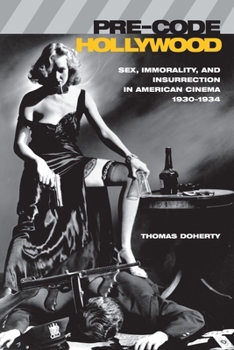Pre-Code Hollywood: Sex, Immorality, and Insurrection in American Cinema, 1930â "1934
Select Format
Select Condition 
Book Overview
Pre-Code Hollywood explores the fascinating period in American motion picture history from 1930 to 1934 when the commandments of the Production Code Administration were violated with impunity in a series of wildly unconventional films--a time when censorship was lax and Hollywood made the most of it. Though more unbridled, salacious, subversive, and just plain bizarre than what came afterwards, the films of the period do indeed have the...
Format:Paperback
Language:English
ISBN:0231110952
ISBN13:9780231110952
Release Date:August 1999
Publisher:Columbia University Press
Length:400 Pages
Weight:1.35 lbs.
Dimensions:1.1" x 6.1" x 9.0"
Grade Range:Postsecondary and higher
Customer Reviews
4 ratings
A thorough picture of an interesting transitionary time in film
Published by Thriftbooks.com User , 15 years ago
As far as scholarly texts go, I found these essays very entertaining, due to the lively-by-definition subject matter and the engaged perspective of Mr. Doherty. Sections of the text focus on different genres of the period, touching on areas of Pre-Code history with an equal hand. In doing so, the author gives as much attention to the expected loose women and unpunished criminals as he does to the nature of newsreel reporting, expeditionary films, or the depiction of race. Some readers may be looking for only the most sensational aspects of the period, but Doherty gives a more complete picture, including ample historical context (outlining the politics behind the creation and eventual enforcement of the code). No prior knowledge of the subject is required, but a certain patience is recommended if the subject is new to you - the movies of the pre-code era were an entirely different animal than those released now, and many look hopelessly dated even to viewers accustomed to films of the classic era of Hollywood.
Censorship and Politics (And Who Can Tell the Difference)
Published by Thriftbooks.com User , 23 years ago
Thomas Doherty's Pre-Code Hollywood (Sex, Immorality, and Insurrection in American Cinema 1930 - 1934) is a wonderful study of Hollywood and the movies it produced before the Production Code gained its censorious teeth and bloodied them on celluloid. The most significant and interesting aspects of the book were the politics involved, both in the production of the movies and the movies themselves. Movies looked at vice, poverty, and politics, for example, with eyes wide open and this frightened many people in power who led a successful campaign against the industry. This book tells that tale very effectively. It is a joy to read.
When Hollywood Films Weren't For Kids
Published by Thriftbooks.com User , 24 years ago
Most film afficionados know about the milestone films that lead the Hays Office to establish a type of censorship code of ethics for the major film studios. This well researched book goes beyond the Mae West and gangster films, and offers a penetrating look at many forgotten films that were aimed at an adult audience in the time period between the advent of sound in the late 1920's and 1934, when the Hollywood Production Code was written and adhered to. Before Hollywood went "Hollywood" to present a fairy tale portrayal of 1930's depression America, a surprisingly high number of films addressing realistic social issues and sexual mores were written, filmed, and released to a wide audience. It would be almost thirty years before Hollywood would return to, and go beyond, its pre-code roots.Doherty includes discussions of many well-known films in his narrative, but also does justice to long-forgotten films rarely seen since their original release. Although films stars such as Barbara Stanwyck and James Cagney established their screen presence and characters in the pre-code films, we usually remember them for their later work, with a few rare exceptions like Cagney's Public Enemy. Doherty recalls the early films of stars like these, and also remembers actors and actresses unknown to the current generation of filmgoers.Many of the films covered in this book were ventures with low or moderate budget ventures, but they had a strong impact on audiences. Comparing a pre-code Warners musical like 42 Street to one of its post-code counterparts, like Golddiggers of 1935 illustrates the major change in tone and attitude films acquired as a result of the code. Pre-code language was stronger, more skin was shown, and plots were not sugar-coated with mandatory happy endings. Doherty paints a strong picture of a movie era too often glossed over in most film histories.
A sometimes eye-opening account of a (mostly) forgotten era
Published by Thriftbooks.com User , 24 years ago
With the proliferation of 24-hour "Classic movie" channels, television viewers are finally treated to an almost forgotten world: Uncut Hollywood movies made during the height of the Depression and under much less censorship than would apply from 1934 onward. With insight and humor, Thomas Doherty describes why the years 1930-1934 were so different from what had come before (the ephemeral silent era) and, especially, what came after July 1, 1934 when the Catholic Joseph I. Breen took his seat as the head of the Production Code Administration and made movies predictable. From Mae West to Paul Robeson, PRE-CODE HOLLYWOOD, as Mr. Doherty so ably demonstrates, offers so much more than primitive sound recording and future movie legends in their embryonic, all-but-forgotten years.






